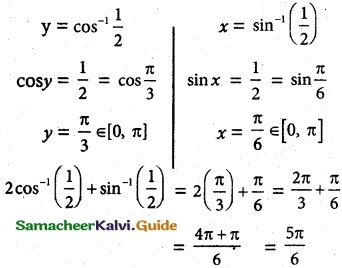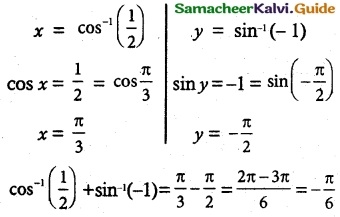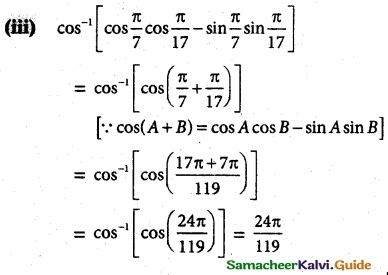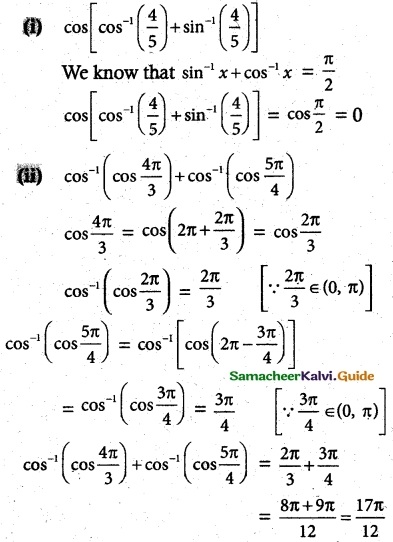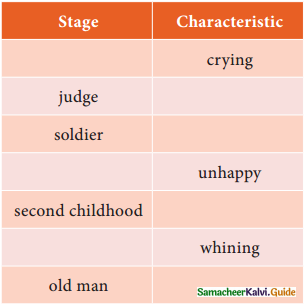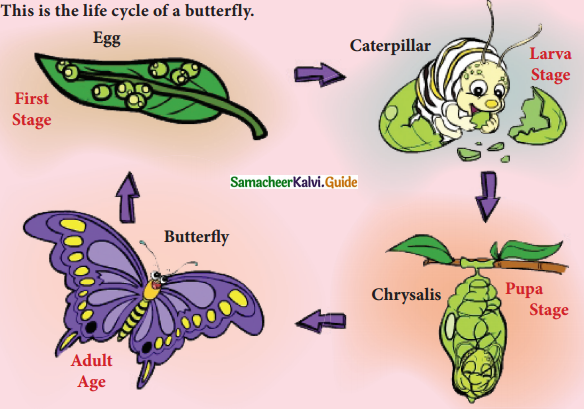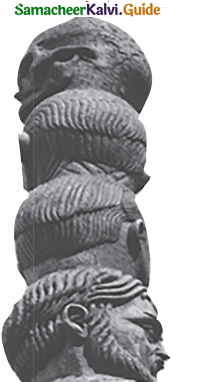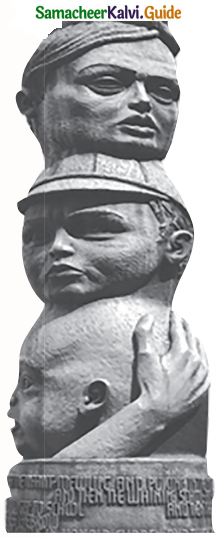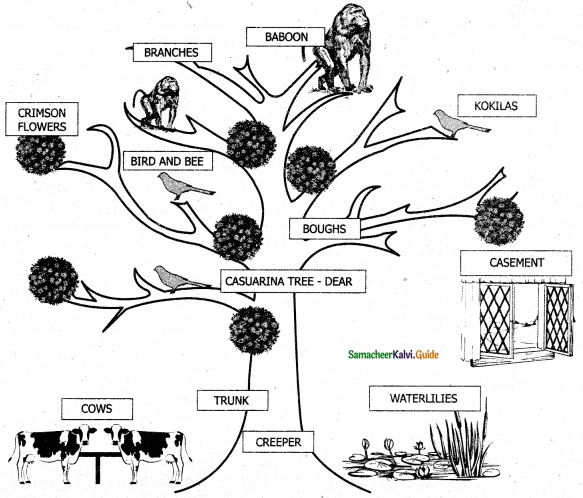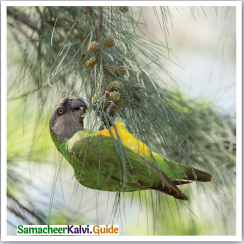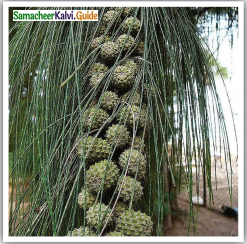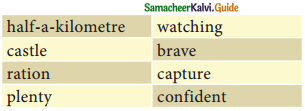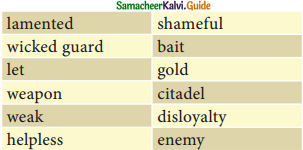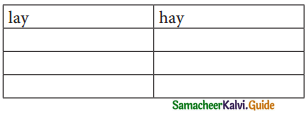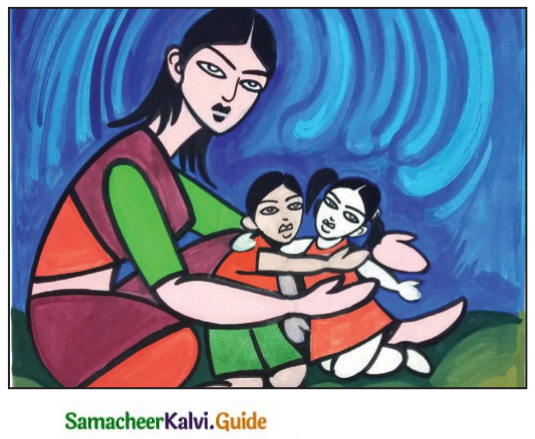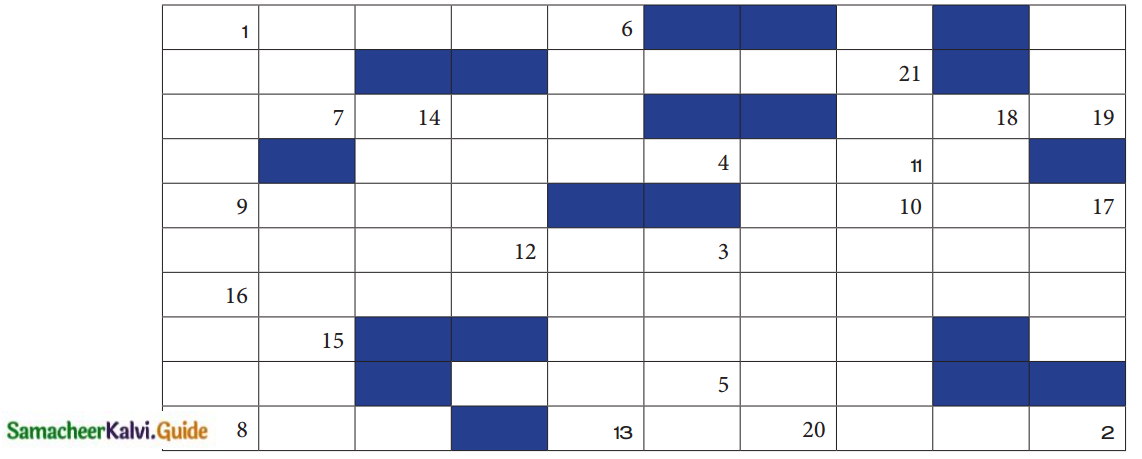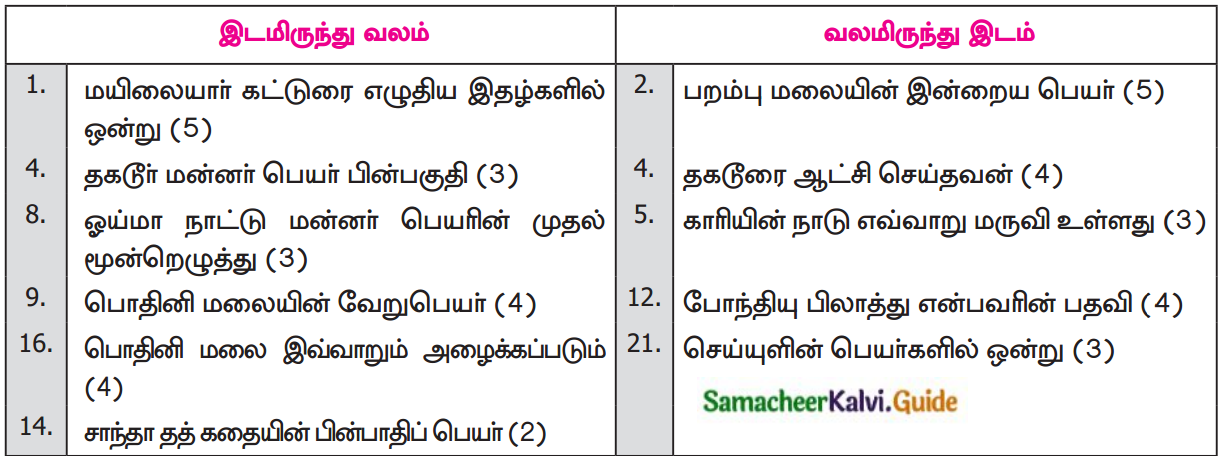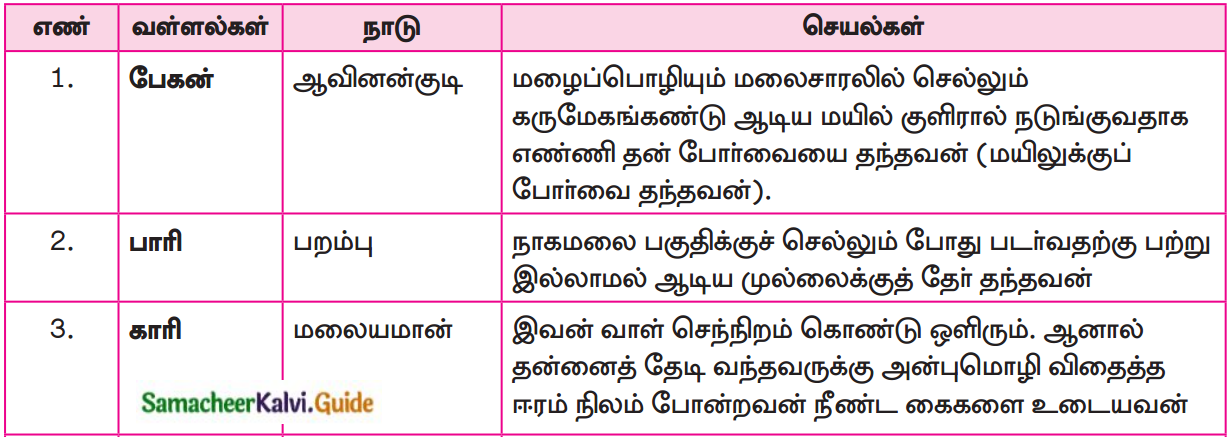Tamilnadu State Board New Syllabus Samacheer Kalvi 12th English Guide Pdf Poem 4 Ulysses Text Book Back Questions and Answers, Summary, Notes.
Tamilnadu Samacheer Kalvi 12th English Solutions Poem 4 Ulysses
12th English Guide Ulysses Text Book Back Questions and Answers
Textual Questions:
1. Complete the summary of the poem, choosing words from the list given below:
Lines 1 to 32:

Ulysses is (1) _________ to discharge his duties as a (2) ______, as he longs for (3) ________. He is filled with an (4) ___________ thirst for (5) __________ and wishes to live life to the (6) ________. He has travelled far and wide gaining (7) _________ of various places, cultures, men and (8). He recalls with delight his experience at the battle of Troy. Enriched by his (9) ________ he longs for more and his quest seems endless. Like metal which would (10) ________ if unused, life without adventure is meaningless. According to him living is not merely (11) ___________ to stay alive. Though old but zestful, Ulysses looks at every hour as a bringer of new things and yearns to follow knowledge even if it is (12) ________.
Answers:
- unwilling
- king,
- travel
- unguenchable
- adventure
- fullest
- experience
- matters
- knowledge
- rust
- breathing
- unattainable
![]()
Lines 33 to 42:
![]()
Ulysses desires to hand over his (1) ______ to his son Telemachus, who would fulfil his duties towards his subjects with care and (2) ______. Telemachus possesses patience and has the will to civilise the citizens of Ithaca in a (3) _______ way. Ulysses is happy that his son would do his work blamelessly and he would pursue his (4) ________ for travel and knowledge.
Answers:
- kingdom
- tender
- prudence
- guest
Lines 44 to 70:

Ulysses beckons his sailors to (1) ________ at the port where the ship is ready to sail. His companions who have faced both (2) ______and sunshine with a smile, are united by their undying spirit of adventure. Though death would end everything, Ulysses urges his companions to join him and sail beyond the sunset and seek a newer (3) _____, regardless of consequences. These brave hearts who had once moved (4) ______ and earth, may have grown old and weak physically but their spirit is young and (5) ______. His call is an inspiration for all those who seek true knowledge and strive to lead (6) _____ lives.
Answers:
- gather
- thunder
- world
- heaven
- undaunted
![]()
2. Answer the following questions in one or two sentences each: (Text Book Page No. 131)
Question a.
‘Ulysses is not happy to perform his duties as a king’ Why?
Answer:
Ulysses is not happy to perform the ordinary duties of a king mainly because his heart is in voyages beyond horizon. He is bored with the task of enforcing law and order and giving reward and punishment to a savage race.
Question b.
What does he think of the people of his kingdom?
Answer:
Ulysses views the people of Ithaca as uncultured and uncivilized. They are like country bumpkins with a little bit of an attitude.
Question c.
What has Ulysses gained from his travel experiences?
Answer:
Ulysses has met people hailing from different cultural backgrounds. He has learned much from their manners, climates, councils, and governments. He learned strategies of warfare in battles.
Question d.
Pick out the lines which convey that his quest for travel is unending.
Answer:
“I cannot rest from travel: I will drink life to the lees;
Question e.
‘As tho’ to breathe were life!’ – From the given line what do you understand of Ulysses’ attitude to life?
Answer:
Ulysses strongly believes that just breathing is not life. Life has to be adventurous and full of action.
Question f.
What does Ulysses yearn for?
Answer:
Ulysses yearns for travel and adventure. He has a passion to travel to unknown lands.
![]()
Question g.
Who does the speaker address in the second part?
Answer:
The speaker addresses the readers in the second part explaining the difference between his roles and that of Telemachus.
Question h.
Why did Ulysses want to hand over the kingdom to his son?
Answer:
Ulysses wanted to hand over the kingdom to his son Telemachus who would fulfill his duties towards his subjects and his son would pursue his quest for travel and knowledge.
Question i.
How would Telemachus transform the subjects?
Answer:
Ulysses believes that his son Telemachus is wise and kind enough to transform rugged citizens into mild and civilized subjects by his tenderness and love.
Question j.
‘He works his work, I mine’ – How is the work distinguished?
Answer:
Here Ulysses’ work and his son’s work are distinguished. At the end of his parting with Ithaca, Ulysses has his duty to hand over his kingdom to his son Telemachus and his son has the duty of ruling the kingdom in a fair manner.
Question k.
In what ways were Ulysses and his mariners alike?
Answer:
Both Ulysses and his fellow sailors are now old. They no more have the strength they possessed in olden days moving earth and heaven. They are made weak by time and fate but strong in will “to strive, to seek, to find and not to yield.” They share the heroic temper and undying quest for knowledge and adventure.
Question l.
What could be the possible outcomes of their travel?
Answer:
The possible outcomes of their travel could be gaining true knowledge and leading meaningful lives.
![]()
3. Identify the figures of speech employed in the following lines:
| Poetic lines | Figure of Speech |
| 1. Thro’ scudding drifts the rainy Hyades Vext the dim sea… | Personification |
| 2. For always roaming with a hungry heart | Metaphor |
| 3. And drunk delight of battle with my peers; | Metaphor |
| 4. the deep, Moans round with many voices. | Personification |
| 5. To follow knowledge like a sinking star. | Simile |
| 6. There lies the port the vessel puffs her sail | Personification |
| 7. ‘I cannot rest from travel’ | Oxymoron |
| 8. The thunder and sunshine, and opposed | Metaphor |
| 9. ‘I will drink life to the lees’ | Metaphor |
| 10. ‘Yet all experience is an arch’ Gleams that untravelled world whose margin fades to store and hoard me, A rugged people, and thro’ Subdue them to the useful The long day wanes: the slow moon climbs: smite the sounding furrows; for my purpose holds | Metaphor |
| 11. ‘T is not too late to seek a newer world. Souls that have toil’d, and wrought, and thought | Synecdoche |
| 12. Match’d with an aged wife 1 mete and dole | Alliteration |
| 13. ‘For some three suns to store and hoard myself,’ | Alliteration |
| 14. ‘Of common duties, decent riot to fail’ | Alliteration |
| 15. ‘The long day wanes: the slow moon climbs: the deep” | Alliteration |
| 16. ‘Push off and sitting well in order smite’ | Alliteration |
| 17. ‘Push off and sitting well in order smite’ | Alliteration |
![]()
4. Read the sets of lines from the poem and answer the questions that follow: (Text Book Page No. 132)
a) ……..I mete and dole ”
Unequal laws unto a savage race,
That hoard, and sleep, and feed, and know not me.
i. What does Ulysses do?
Answer:
Ulysses awards rewards and punishments to his people.
ii. Did he enjoy what he was doing? Give reasons.
Answer:
No, he didn’t enjoy what he was doing. He thought this life a waste when compared with the previous life (adventurous life). He also complained that the people were savage and they were only eating and sleeping.
b) Yet all experience is an arch wherethrough
Gleams that untravelled world, whose margin
fades
Forever and forever when I move.
i. What is experience compared to?
Answer:
Experience is compared to an ‘arch’.
ii. How do the fines convey that the experience is endless?
Answer:
His desire is to keep travelling and living a life of adventure.
c) Little remains: but every hour is saved
From that eternal silence, something more,
A bringer of new things; and vile it were
i. How is every hour important to Ulysses?
Answer:
As every hour passes, Ulysses gains experience.
ii. What does the term Little remains to convey?
Answer:
He is old and is left with a few more days of life.
![]()
d) This is my son, mine own Telemachus,
To whom I leave the sceptre and the isle Well-loved of me,
i. Who does Ulysses entrust his kingdom to, in his absence?
Answer:
Ulysses desires to hand over his kingdom to his son Telemachus.
ii. Bring out the significance of the ‘sceptre’.
Answer:
A ‘Sceptre’ is a ceremonial staff that symbolizes authority. Here, Ulysses gave the sceptre to his son. Who would do his work blamelessly and fulfill his duties towards his subjects with care?
e) That ever with a frolic welcome look
The thunder and the sunshine, and opposed
i. What do ‘thunder’ and ‘sunshine’ refer to?
Answer:
‘Thunder’ and ‘Sunshine’ refer to bad times and good times.
ii. What do we infer about the attitude of the sailors?
Answer:
We infer that the sailors have brave hearts. They had once moved heaven and earth, may have grown old and weak physically but their spirit is young and undaunted. Thus the sailor’s attitude is young and energetic.
f) Death closes all: but something ere the end,
Some work of noble note may yet be done,
Not unbecoming men that strove with Gods.
i. The above lines convey the undying spirit of Ulysses. Explain.
Answer:
Ulysses wants to do something great which can outweigh his previous achievements. He wants to achieve before his death.
ii. Pick out the words in alliteration in the above lines.
Answer:
ere, end
noble, note.
g) ……………for my purpose holds
To sail beyond the sunset and the baths
Of all the western stars, until I die.
i. What was Ulysses’ purpose in life?
Answer:
Ulysses purpose in life was to travel to unknown lands.
ii. How long would his venture last?
Answer:
His venture would last till his death.
h) One equal temper of heroic hearts,
Made weak by time and fate, but strong in will
To strive, to seek, to find, and not to yield.
i. Though made weak by time and fate, the hearts are heroic. Explain.
Answer:
Ulysses and his companions have brave hearts who had once moved heaven and earth, may have grown old and weak physically but their spirit is young and undaunted.
ii. Pick out the words in alliteration in the above lines.
Answer:
heroic hearts strive to seek.
![]()
Additional Questions:
a) “Match’d with an aged wife, I mete and dole”
i) Whom does ‘I’ refer to?
Answer:
‘I’ refer to king Ulysses.
ii) What does the word ‘mete’ mean?
Answer:
The word ‘mete’ means ‘to allot’ or ‘measure out’.
b) ‘Thro’ scudding drifts the rainy Hyades’
i) Explain ‘Scudding drifts’
Answer:
‘Scudding drifts’ are pounding showers of rain that one might encounter at sea during a storm.
ii) What do you mean by ‘Hyades’?
Answer:
‘Hyades’ means a group of stars in the constellation.
c) “Myself not least, but honour’d of them all
And drunk delight of battle with my peers”
i) Explain the phrase ‘Myself not least’.
Answer:
‘Myself not least’ means, Ulysses wasn’t treated like the least little thing but was honoured by everybody he met.
ii) Name the battle mentioned in the above lines.
Answer:
‘The battle of Troy’ is mentioned.
![]()
d) “Well-loved of me, discerning to fulfill
This labour, by slow prudence, to make mild”
i) Whose labour is mentioned as ‘this labour’?
Answer:
Son of Ulysses ‘Telemachus’ labour is mentioned here.
ii) How does Telemachus do his duties?
Answer:
Telemachus does his duties with care and mild. He will civilise the citizen of Ithaca ina prudence way.
e) “A rugged people and through soft degrees
Subdue them to the useful and the good
i) Who are rugged people?
Answer:
The people of Ithaca are rugged people.
ii) What does ‘rugged’ mean here?
Answer:
‘Rugged’ means that the people are a little uncivilized and uncultured.
f) “Death closes all but something ere the end,
Some work of noble note may yet be done”
i) What does ‘ere’ mean?
Answer:
‘ere’ means an old poetic word that means ‘before’.
ii) Is the poet ready to stop his work (travel)?
Answer:
No, the poet is not ready to stop his work (travel).
g) “I may be we shall touch the Happy Isles And see
the great Achilles, whom we knew”
i) What is referred to as ‘happy isles’?
Answer:
‘Happy Isles’ is referred to as the islands of the blessed.
ii) Who can be seen in the happy isles?
Answer:
Greek heroes like Achilles can be seen in the happy isles.
![]()
5. Explain with reference to the context the following lines: (Text Book Page No. 133)
a) I cannot rest from travel: I will drink
Lie to the lees:
Reference:
These lines are taken from Poem – “Ulysses”, Poet – “Alfred Tennyson”.
Context:
The poet brings out Ulysses’s passion for travelling.
Explanation:
Ulysses decides that he cannot rest and wants to travel beyond. He is a restless spirit who doesn’t want to take a break from roaming the ocean in search of adventure.
b) I become a name;
For always roaming with a hungry heart
Reference:
These lines are taken from Poem – “Ulysses”, Poet – “Alfred Tennyson”.
Context:
The poet brings out Ulysses’s fame.
Explanation:
Ulysses has become famous because he travelled to so many places. He has travelled far and wide gaining experience of various places, cultures, men, and matters.
c) How dull it is to pause, to make an end,
To rust unburnished, not to shine in use!
Reference:
These lines are taken from Poem – “Ulysses”, Poet – “Alfred Tennyson”.
Context:
The poet brings out Ulysses’ boredom.
Explanation:
Ulysses gets boredom by just sitting around when he could be out exploring the world. Ulysses thinks himself to some kind of metallic instrument that is still perfectly useful and shiny but just rusts if nobody uses it. So he likes to travel far away, instead of being king in Ithaca.
d) To follow knowledge like a sinking star,
Beyond the utmost bound of human thought.
Reference:
These lines are taken from Poem – “Ulysses”, Poet – “Alfred Tennyson”.
Context:
The poet compares Ulysses to a ‘Sinking Star’.
Explanation:
On the one hand, Ulysses wants to chase after knowledge and try to catch it as it sinks like a star. On the other hand, Ulysses himself could be the ‘sinking star that makes sense too he is a great personality who is moving closer to death.
e) ‘He works his work, I mine
Reference:
This line is taken from Poem – “Ulysses”, Poet – “Alfred Tennyson”.
Context:
The poet talks about Ulysses’ work and his son’s work.
Explanation:
At the end of his parting with Ithaca, Ulysses has his duty to hand over his kingdom to his son Telemachus and his son has the duty of ruling the kingdom in a manner.
![]()
f) “You and I are old:
Old age hath yet his honour and his toil;”
Reference:
These lines are taken from Poem – “Ulysses”, Poet – “Alfred Tennyson”.
Context:
The poet talks about the spirit and power of Ulysses mental strength
Explanation:
Ulysses and his companions have brave hearts who had once moved heaven and çarth, may have grown old and weak physically but their spirit is young and undaunted.
g) The long day wanes the slow moon climbs: the deep
Means round with many voices”
Reference:
These lines are taken from Poem – “Ulysses”, Poet – “Alfred Tennyson”.
Context:
The poet brings out the time of the journey of Ulysses and his companions.
Explanation:
He starts his journey to gain indented success. He says to his mariners not to forget that they have fought with the gods and they are the same persons who are now going for an adventure. He says that it is getting night and stars are coming out, the moon is appearing. It is the time they started their journey to get fresh knowledge and adventure.
h) It may be we shall touch the Happy Isles
And see the great Achilles, whom we knew”
Reference:
These lines are taken from Poem – “Ulysses”, Poet – “Alfred Tennyson”.
Context:
The poet brings out the confidence of Ulysses to reach Happy Isles.
Explanation:
Ulysses and his companion may reach Happy isles which can be assumed as heaven. There he has the ambition to meet his co- warrior in the war of Trojan. The Warrior wants to meet Achilles. All the warriors who are presently sailing knew Achilles very well.
i) “We are not that strength which in old days
moved earth and heaven;
Reference:
These lines are taken from “Ulysses”, Poet – “Alfred Tennyson”.
Context:
The poet brings out the daring performance of Ulysses and his companion.
Explanation:
Ulysses and his companions have brave hearts who had once moved heaven and earth, may have grown old and weak physically. But they still have the will to seek out and faœ challenges without giving up.
j) “To strive, to seek to find and not yield”.
Reference:
These lines are taken from “Ulysses”, Poet – “Alfred Tennyson”.
Context:
The poet brings out Ulysses’ determination in his work (travel).
Explanations:
Ulysses urges his companion to join him and sail beyond the sunset and seek a newer world. Ulysses is an inspiration for all those who seek true knowledge and strive to lead meaningful lives.
![]()
6. Answer the following questions in a paragraph of about 100 words each: (Text Book Page No. 133)
a) What makes Ulysses seek a newer adventure?
Answer:
Ulysses once a great hero of Ithaca is very aware that he is now old. Ulysses is unwilling to discharge his duties as a king as he longs for travel.
“I cannot take rest from travel; I will drink
Life to the lees: All time I have enjoyed”.
Ulysses is filled with an unquenchable thirst for adventure and wishes to live to the fullest. He has travelled far and wide gaining experience of various places, cultures, men, and matters. Ulysses wants to chase after knowledge and try to catch it as it sinks Ijke a star. Every hour is important to Ulysses because he has already wasted the time to be in Ithaca. Ulysses wants every hour as a bringer of new things and to yearn for more knowledge by travelling.
b) List the roles and responsibilities Ulysses assigns to his son Telemachus, while He is away:
Answer:
Ulysses obviously loves his son Telemachus. He assumes that Telemachus will be able to effectively rule the subjects and citizens of Ithaca with wisdom.
“This is my son, mine own Telemachus,
To whom I have the sceptre and the Isle,-”
Ulysses desires to hand over his kingdom to his son Telemachus, who would fulfill his duties towards his subjects with care and tenderness. His son is the right person to rule the people of Ithaca and He will surely civilise them in a prudence way. The people of Ithaca are rugged people which means they are a little uncivilized and uncultured but his son will rule them in a fine way. Ulysses is happy that his son would do his work blamelessly and he would pursue his quest for travel and knowledge.
![]()
c) What is Ulysses clarion’s call to his sailors? How does he inspire them?
Answer:
Ulysses was the king of Ithaca. He was very brave and courageous. He went on many adventures on the sea with his companions and fought many battles bravely. Ulysses beckons his sailors to gather at the port where the ship is ready to sail. His Companions who have faced both thunder and sunshine with a smile are united by their undying spirit of adventure.
His companions have brave hearts who had once moved heaven and earth, which means good times and bad times they may have grown old and weak physically but their spirit is young and undaunted. To start another great and long voyage. They will not surrender themself and try to discover a new world. His call is an inspiration for all those who seek true knowledge and strive to lead meaningful lives.
“To Strive to seek to find and not to yield”.
Paragraph:
a) What makes Ulysses seek a newer adventure?
b) List the roles and responsibilities Ulysses assigns to his son Telemachus, while He is away.
c) What is Ulysses clarion’s call to his sailors? How does he inspire them?
Introduction:
Ulysses was the king of Ithaca. He does not want to end his life as an idle king, but seek true knowledge and strive to lead meaningful lives.
Thirst for travel:
Ulysses is filled with an unquenchable thirst for travel and wishes to live life to the fullest. He has travelled far and wide gaining knowledge of various places, cultures men, and matters. Enriched by the experience he longs for more and his quest seems endless. Like metal that would rust if unused, life without adventure is meaningless. Ulysses looks at every hour as a bringer of new things and yearns to follow knowledge even if it is unattainable.
Son of Ulysses:
Ulysses desires to hand over his kingdom to his son Telemachus who would fulfill his duties towards his subjects with care and prudence. He would ‘civilise the citizens of Ithaca in a tender way.
Ulysses companions:
Ulysses beckons his sailors to gather at the port where the ship is ready to sail. His companions who have faced both thunder and sunshine with a smile are united by their undying spirit of adventure. Ulysses urges his companions to join him and sail beyond the sunset and seek a newer world regardless of the consequences. His call is an inspiration for all those who seek true knowledge and strive to lead meaningful lives.
Conclusion:
Thus Ulysses’ unquenchable thirst for travel is clearly dealt in this poem.
![]()
Listening:
Listen to the poem and fill in the blanks with appropriate words and phrases. If required listen to the poem again.
Choose the best option and complete the sentences.
Question 1.
________ works like madness ¡n the poet.
a) Wander—Thirst
b) Bidding Farewell
c) Eastern Sunrise
d) Western Seas
Answer:
a) Wander—Thirst
Question 2.
A man could choose ________ as his guide.
a) the sun
b) the hills
C) a star
d) a bird
Answer:
c) a star
Question 3.
There is no end of________ once the voice is heard.
a) walking
b) roaming
c) talking
d) voyaging
Answer:
d) voyaging
Question 4.
The old ships return, while the young ships ______.
a) drift
b) move
C) sail
d) wander
Answer:
c) sail
Question 5.
The blame is on the sun, stars, the road, and the _____.
a) hills
b) trees
c) seas
d) sky
Answer:
d) sky
![]()
கவிஞரைப் பற்றி:
ஆல்பிரர் லாட் டென்னிசன் (Alfred Lord Tennyson) (6 August 1809 – 6 October 1892) பிரிட்டிஸ் (British) கவிஞர். இவர் விக்டோரியா ராணியின் காலத்தைச் சார்ந்த ஒரு கவிச்சக்கரவர்த்தி (Poet Laureate). பிரிட்டிஸ் அரசாட்சியைச் சார்ந்த புகழ்பெற்ற புலவர்களில் இவரும் ஒருவர். “Break Break Break”, “The charge of the light Brigade”, “Tears, Idle Tears” மற்றும் “Crossing the bar” போன்ற சிறிய கவிதைகளை எழுதியுள்ளார். கிரேக்க இதிகாசங்களையும் இவர் கவிதை வடிவில் தந்துள்ளார். “Ulysses” மற்றும் “Idylls of the king and Tithonus” ஆகியவை அதற்கு சான்று. இசையோடு வார்த்தைகளை படைப்பது டென்னிசனின் தனித் திறமையே.
கவிதையைப் பற்றி:
கல்ஃப்ரட் லார்ட் டெனிசனின் “Ulysses” ஆங்கில இலக்கியத்தின் புகழ்பெற்ற நாடகத்தனி மொழிப் பாடல்களில் ஒன்று. “Ulysses” கிரேக்க நாட்டின் மாபெரும் வீரன். 20 ஆண்டுகள் கழித்து தன் நாடான இத்தாலிக்கு வருகிறான். பல நாடுகள் சென்று வெற்றி கொண்டு அங்குள்ள கலாச்சாரங்களை அறிகிறான்.
அதன் மூலம் பரந்து விரிந்த அறிவை பெறுகிறான் அந்த அறிவு தான் சாகும் வரை நீடிக்க வேண்டும் என்று எண்ணி தன் மகன் டெலமாகஸ்னிடம் நாட்டை ஒப்படைக்கிறது. அவனை மக்களை ஆட்சி செய்ய பணிக்கிறான். அவனைக் கொண்டு தன் நாட்டை நாகரீக பூமியாக மாற்றுகிறான்.
யுலிசஸ் என்பது ஒரு நாடக தனியுரை. இது வரிகளைக் கொண்ட முறையற்ற கவிதை. இதாகாவின் அரசனான யுலிசஸ் போருக்கு தன் படையைத் தயார் செய்கிறான். அவன் அவர்களுக்கு நேரத்தை வீணடிக்க கூடாது என அறிவுறுத்துகிறான். ட்ராய் போர் மற்றும் பல சமுத்திர சாதனைகளை கண்ட யுலிசஸ் வயது முதிர்ந்தவராகிறார். இதற்காக திரும்பி வந்த உடனே அடுத்த சாதனை படைக்க யுலிசஸ் தயாராகிறார். இன்னும் அதிகமான சாதனை படைப்பதே அவரது இலட்சியம்.
இந்த கவிதை மூன்று பாகங்களாக பிரிக்கப்படுகிறது. (அ) தனது நாட்டில் தன்னை இருக்கவிடாமல தொடர்ந்து சாதனை படைக்க எண்ணும் அவனது ஆர்வம், (ஆ) டெலிமேகஸ்க்கு செய்ய வேண்டிய கடமைகள் மற்றும் மகன் மீது அவன் கொண்ட நம்பிக்கை, (இ மாலுமிகளுக்கு புதிய தெரியாத நாடுகளைக் கண்டறிய உரத்தக் குரலில் யுலிசஸ் விடுக்கும் அழைப்பு.
![]()
Ulysses Summary in Tamil
உயர் மன்னருக்கு எந்த பயனுமில்லை – மனைவியுடன்
உலையருகில் அமர்ந்து பாறைகள் நடுவில் குளிர்காய்வதால்
உண்மை வேந்தன் யாரென்றே அறியா மக்களுக்கு
உட்கார்ந்து சட்டதிட்டங்களை வகுத்துக் கொண்டிருப்பதால்,
உருத்தலின்றி ஓயாமல் உண்டு ஓய்வெடுக்கும் இந்த மக்களால்
பயணத்திலிருந்து ஓய்ந்திருக்க முடியாது – வாழ்க்கையின்
அடியாழம் வரை சென்று (life to the lees) அனுபவிக்கப் போகிறேன்.
உச்ச இன்பமும் கண்டிருக்கிறேன் உச்ச வலியும் பெற்றிருக்கிறேன்.
என் அன்புக்குரியவர்களுடனும், தனிமையிலும், கடற்கரைகளிலும் (shore)
மழைதரும் நட்சத்திர குழுமங்களின் விரைவு சறுக்கலில்,
சமுத்திரமே சிக்கல்களுக்குள்ளானது. நான் பிரபலமாகிறேன்,
ஓயாமல் ஓடிக் கொண்டிருக்கும் என் தீராத் தாகம் கொண்ட இதயத்தால்.
பல நகரத்து மனிதர்களை நான் நன்கு அறிந்திருக்கிறேன்.
வேறுபட்ட பண்புகள், காலநிலை மற்ற அரசாங்கங்களுடன்,
அங்கு அனைவராலும் நான் கௌரவிக்கப்பட்டேன், (honour’d)
போர்களின் வெற்றியை நண்பர்களுடன் பகிர்ந்து பருகியிருக்கிறேன்.
ட்ராய் (Troy) போரில் சமவெளிகள் கூட சத்தமிட்டுக் கொண்டிருந்தன
நான் சந்தித்த அனைத்திலும் எனக்கும் பங்குண்டு
இருந்தும் இந்த அனுபவங்கள் வெறும் நுழைவாயிலே
எல்லைகள் மங்கும் பயணிக்கா உலகின் பிராகசத்திற்கு
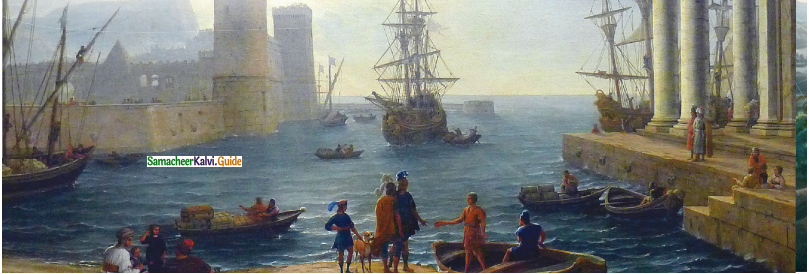
எப்போதும் எல்லாநேரமும் நான் பயணிக்கும் போது
அதை முடிக்க நிறுத்துவது எவ்வளவு சோகமானது
உபயோகிக்காமல் அந்த அனுபவத்தை வீணாக்குவது
மூச்சுவிடுவது மட்டுமல்ல வாழ்க்கை, வாழ்க்கை மேல் வாழ்க்கை
ஒன்று என்பது மிகச் சொற்பம் எனக்கு
நான் வாழும் ஒவ்வொரு மணிநேரமும்
சாவின் கையிலிருந்து நான் காப்பாற்றிய கணம் ஒவ்வொன்றும்
புதுப்புது அனுபவம் தருவது, மற்றும் வெறுக்கத்தக்கது
வெறும் மூன்று வருடங்களுக்குள் என்னைத் தொலைப்பது,
ஏக்கத்தோடு விரும்புகிறது என் மனது
மூழ்கும் நட்சத்திரமாய் அறிவை பின்பற்றுவதற்கு
மனித சிந்தனையின் எல்லைகளையும் தாண்டி,
இது என் மகன், என் சொந்த மகன் டெலிமேக்ஸ்,
இவனுக்காகவே நான் விட்டுச்செல்கிறேன் இத்தீவையும் என் செங்கோலையும்
என் அன்புக்குரியவன், இப்பணியைச் செய்யவே வந்தவன்
எளிய ஞானத்தால் கடினமானவர்களை கனியச் செய்பவன்.
மற்றும் இலகுவான முறையில் இளைத்திடுவான்
அவர்களை உபயோகமானவர்களாகவும் நல்லவர்களாகவும்
கள்ளம் கூறவே முடியாதவன், பொது வாழ்வின்
மையமானவன், தோற்பதற்காக பிறவாதவன்
இளமையான அலுவல்களிலும் எம் இல்ல
இறைவனுக்கும் ஆராதனை செலுத்துவான்,
நான் சென்றபின் அவன் தன் வேலையைச் செய்கிறான். நான் என்னுடையதாக
அங்கிருக்கிறது துறைமுகம், கப்பல்கள் கிழம்பிய நிலையில்,
அங்குள்ளது அந்த கடிய, கரிய, பரந்த கடல் என் மாலுமிகள்
என்னோடு உழைத்து, உருவாக்கி, நினைத்த ஆத்மாக்கள்
இடியையும் சூரிய ஒளியையும் எப்போதும்
இன்முகத்துடன் எதிர்த்து நின்று வரவேற்பவர்கள்.
சுதந்திர இதயத்தோடும் நெற்றியோடும் நீயும் நானும் வயதானோர்,
முதிய வயதுடன் இன்னுமுண்டு பெருமையும் கடின உழைப்பும்,
இறப்பு அனைத்தையும் முடிக்கிறது. ஆனால் அதற்குமுன்
சில நல்ல செயல்கள் செய்யப்பட உள்ளது,

அது கடவுளோடு நடப்பவருக்கு பொருந்தாது.
பாறையினின்று வெளிச்சம் மிளிரத் துவங்குகிறது,
நீண்ட பகல் மறைகிறது. நிலவு துளிர்கிறது, ஆழ்ந்த
முணக்கங்கள் பல குரல்களால் சூழப்படுகிறது வாருங்கள் நண்பரே,
இன்னும் தாமதமில்லை புதிய உலகை தேடுவதற்கு
தள்ளுங்கள், ஒழுங்காய் அமர்ந்து ஒலியெழுப்பும்
கடல் எல்லைக் கோடுகளை அடிப்பதற்கு, ஏனெனில் என் இலக்கு
சூரிய அஸ்தமனத்தைத் தாண்டிய நிலப்பகுதிக்கு பயணிப்பது
அனைத்து மேற்கத்திய நட்சத்திரங்களுக்கு, இறக்கும் வரை
அந்த வளைகுடாக்குள் நம்மை அழித்து விடலாம்
மகிழ்ச்சித் தீவை நாம் அடைந்து நாமறிந்த
ஆகிலஸின் முகத்தையும் நாம் பார்க்கலாம்.
பலவற்றை நாம் பெற்றிருந்தும், பலவற்றை பொருத்திருந்தும்
பழைய பலத்தை நாம் இப்போது பெற்றிறாவிடினும் –
முன்பு பூமியையும் வானத்தையும் நகர்த்திய நாம், நாம் தான்,
ஒரு சிறந்த இதயத்தின் சமநிலை காலத்தாலும் விதியாலும் வலுவிழக்கிறது,
ஆனால் வலுப்பெறுகிறது. போராடி, தேடி அடைய வேண்டும்,
விடக் கூடாது என்ற மன உறுதியில்.
